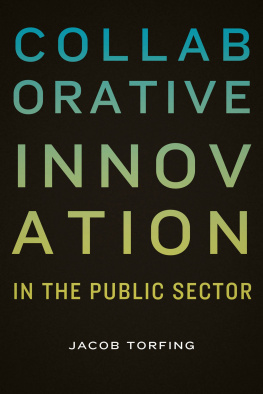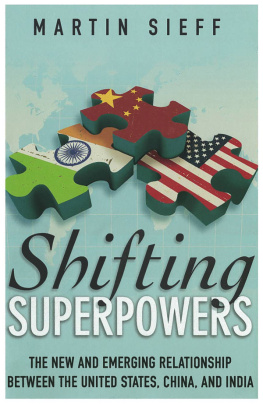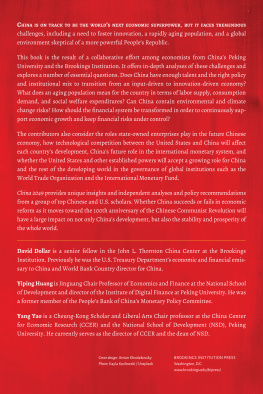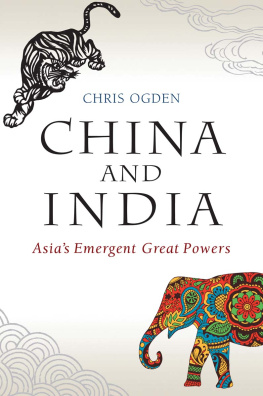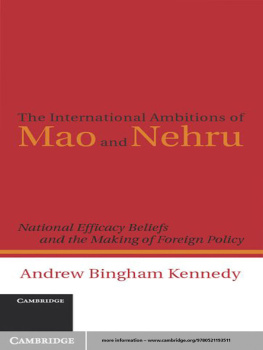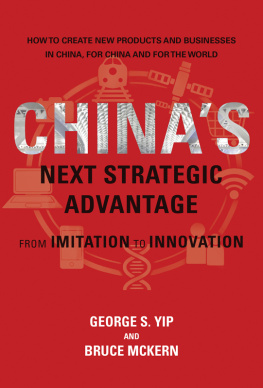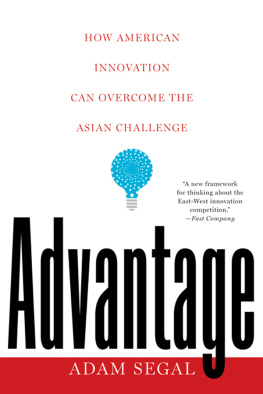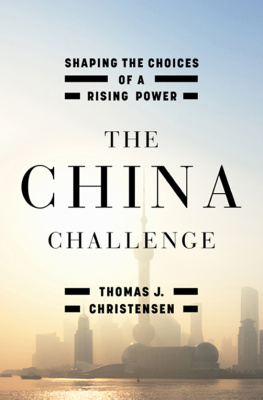THE CONFLICTED SUPERPOWER
A NANCY BERNKOPF TUCKER AND WARREN I. COHEN BOOK ON AMERICAN-EAST ASIAN RELATIONS
Edited by
Thomas J. Christensen
Mark Philip Bradley
Rosemary Foot
Michael J. Green, By More Than Providence: Grand Strategy and American Power in the Asia Pacific Since 1783
Jeanne Guillemin, Hidden Atrocities: Japanese Germ Warfare and American Obstruction of Justice at the Tokyo Trial
Nancy Bernkopf Tucker was a historian of American diplomacy whose work focused on AmericanEast Asian relations. She published seven books, including the prize-winning Uncertain Friendships: Taiwan, Hong Kong, and the United States, 19451992. Her articles and essays appeared in countless journals and anthologies, including the American Historical Review, Diplomatic History, Foreign Affairs, and the Journal of American History. In addition to teaching at Colgate and Georgetown (where she was the first woman to be awarded tenure in the School of Foreign Service), she served on the China desk of the Department of State and in the American embassy in Beijing. When the Office of the Director of National Intelligence was created, she was chosen to serve as the first Assistant Deputy Director of National Intelligence for Analytic Integrity and Standards and Ombudsman, and she was awarded the National Intelligence Medal of Achievement in 2007. To honor her, in 2012 the Woodrow Wilson International Center for Scholars established an annual Nancy Bernkopf Tucker Memorial Lecture on U.S.East Asian Relations.
Warren I. Cohen is University Distinguished Professor Emeritus at Michigan State University and the University of Maryland, Baltimore County, and a senior scholar in the Asia Program of the Woodrow Wilson Center. He has written thirteen books and edited eight others. He served as a line officer in the U.S. Pacific Fleet, editor of Diplomatic History, president of the Society for Historians of American Foreign Relations, and chairman of the Department of State Advisory Committee on Historical Diplomatic Documentation. In addition to scholarly publications, he has written for the Atlantic, the Baltimore Sun, the Christian Science Monitor, Dissent, Foreign Affairs, the International Herald Tribune, the Los Angeles Times, The Nation, the New York Times, the Times Literary Supplement, and the Washington Post. He has also been a consultant on Chinese affairs to various government organizations.
ANDREW B. KENNEDY
THE CONFLICTED SUPERPOWER
Americas Collaboration with China and India in Global Innovation
Columbia University Press / New York
Columbia University Press
Publishers Since 1893
New York Chichester, West Sussex
cup.columbia.edu
Copyright 2018 Columbia University Press
All rights reserved
E-ISBN 978-0-231-54620-1
Library of Congress Cataloging-in-Publication Data
Names: Kennedy, Andrew Bingham, 1968 author.
Title: The conflicted superpower : Americas collaboration with China and India in global innovation / Andrew Bingham Kennedy.
Description: New York : Columbia University Press, [2018] | Includes bibliographical references and index.
Identifiers: LCCN 2017048743 (print) | LCCN 2018003615 (ebook) | ISBN 9780231546201 (electronic) | ISBN 9780231185547 (cloth : acid-free paper)
Subjects: LCSH: United StatesForeign economic relations21st century. | GlobalizationPolitical aspectsUnited States. | IndiaForeign economic relations21st century. | ChinaForeign economic relations21st century.
Classification: LCC E895 (ebook) | LCC E895 .K46 2018 (print) | DDC 327.73009/05dc23
LC record available at https://lccn.loc.gov/2017048743
A Columbia University Press E-book.
CUP would be pleased to hear about your reading experience with this e-book at .
Cover design: Diane Luger
Cover image: ryanking999
For Shameem, Sanya, and Jasper
CONTENTS
I F THIS IS a book about innovation, writing it felt like an innovation in my academic career. My first book focused on the foreign policies of China and India, with the United States looming in the background. In this book, the emphasis is reversed. As with many innovations, the roots of this one are apparent in retrospect. American politics has always loomed large in my life, particularly as I grew up surrounded by legislators and lobbyists in the suburbs of Washington, D.C. When I chose to pursue a masters degree at the Fletcher School in my mid-twenties, it was an easy choice to specialize in U.S. foreign policy, even as I became increasingly interested in Asia. In the years that followed, I worked as a consultant in Hong Kong, Beijing, and Washington, scrutinizing U.S. political and economic relations with Asian countries. It was my passion for U.S. foreign policy, particularly toward Asia, that drove me to become an academic in the first place.
This book is about one aspect of U.S. foreign policy: its approach to the globalization of technological innovation. I have focused on this issue not only because it is enormously important, but also because it is so poorly understood. The importance part is clear. For more than seven decades, technological leadership has sustained U.S. economic and military leadership in the international system. Rising powers like China and India, meanwhile, envy the U.S. track record and now seek to become innovation powerhouses in their own right. These quests for innovation, however, are not conducted in isolation. Instead, the United States, China, and India are increasingly intertwined as they pursue technological leadership, owing to cross-border flows of highly skilled people and high-tech investments that are without precedent in history. The policies of the worlds innovation leader are particularly important as this process unfolds, but as I will explain in the introduction, they are also particularly puzzling. To my mind, no one has explained why. For all these reasons, this book focuses on the politics behind U.S. collaboration with China and India in global innovation.
I had a great deal of help from others as I researched and wrote this book. First, I want to give special thanks to the many individuals in the United States, China, and India who agreed to be interviewed for this project. Many of these individuals are mentioned in the notes of the chapters that follow, but some wished to remain anonymous or preferred to speak only on a background basis. I am deeply grateful to all of you.
There are many others to thank as well. I am grateful for feedback on draft portions of the manuscript from an array of very gifted and generous scholars: Bjoern Dressel, David Envall, Taylor Fravel, Luke Glanville, Evelyn Goh, Llewelyn Hughes, Devesh Kapur, Scott Kastner, Adrian Kay, Amy King, Bingqin Li, Darren Lim, Andrew MacIntyre, Ann Neville, Margaret Peters, John Ravenhill, Etel Solingen, Helen Taylor, Joanne Wallis, Fiona Yap, Min Ye, and Feng Zhang. My father, Bingham Kennedy, helped make the introduction far more lucid than it would have been otherwise. A number of research assistants have also provided enthusiastic support over the years: Yu-Hua Chen, Jia Guan, Nan Liu, Rongfang Pan, Nimita Pandey, Aditya Parolia, Zhen Qi, Richard Reid, Haiyang Zhang, and Jiayi Zhang. I have also learned much from conversations with Shiro Armstrong, Tai Ming Cheung, Daniel Costa, Christina Davis, Sumit Ganguly, Dan Gold, David Hart, Ron Hira, Scott Kennedy, Robert Keohane, Anupam Khanna, Xielin Liu, Tanvi Madan, Partha Mukhopadhyay, Pratap Bhanu Mehta, Barry Naughton, Neil Ruiz, Michael Teitelbaum, and Patrick Thibodeau. Last, I want to thank the two anonymous reviewers for Columbia University Press for their very constructive comments on the entire manuscript. Any faults that remain are mine alone.


